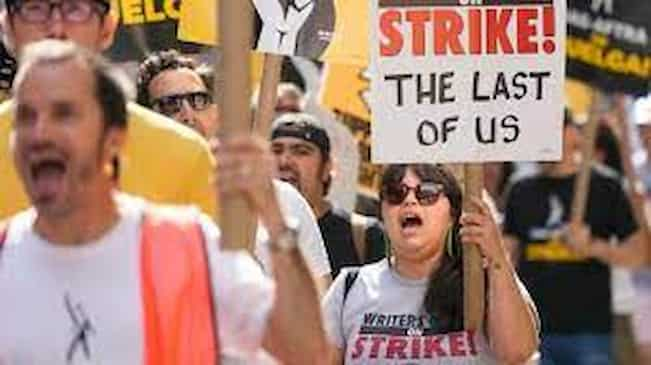Hollywood Thought That The Writers Strike Would End By Summer:
Even though summer is almost over, Hollywood is still in strike hell. In Los Angeles, the Writers Guild of America strike is currently in its fifth month, and it doesn’t look like it’s going to end any time soon.
Since the Writers Guild of America, West, went upon strike almost four months ago, TV plans have changed, movies and shows have been moved, once-glamorous red carpets have gone dark, as well as late-night laughing has stopped.
A few weeks ago, when the agony of the ongoing standoff started to make people wince, studios moved to start talking with the writers again, which gave Tinseltown a cautious sense of hope.
It seemed like there was hope on the horizon after a tiring summer characterized by endless hours of picketing as well as angry speeches.
This Strike Could End Up Being The Longest In WGA History:
If it goes upon much longer, it could become the biggest strike within WGA history. The sister group SAG-AFTRA, representing actors, has been on strike for almost two months.
But those small signs of hope that a deal could be reached proved out to be nothing more than a dream. Now, right before Labor Day Weekend, there is still no deal in sight. Schools are starting up again, and the weather is getting cooler, but Hollywood is still in the middle of a labor struggle that will last forever.
Writers and artists within the film and TV industries can band together and stop working until company bosses agree that they will compensate them sufficient to live in cities like New York as well as Los Angeles. Executives at the studio think they have done a lot in the past few weeks to bring about the standstill.
Overall, Most American Workers Are Not Part Of A Union:
The studios, which were represented by the AMPTP, gave the writers terms that they thought would be a basis for negotiations that would lead to a deal. But they were very, very wrong.
The WGA, which speaks for the writers, laughed at the offer. In a lot of ways, it was way too little for them. But most artists, like most American workers, are not in a union. They either do their work at a net loss or with a very small profit.
The property problem has done a lot of damage to this area. Nic Dyer is a painter who got his start within Baltimore. Because of this, he has been able to join the New York art scene instead of staying on the edges.
Dyer lives in Hillsdale, a small town near Hudson more than two miles away from the city. He and she use the terms they and them. Their rent was $900 per month, which is a lot less than what they would have to pay in Manhattan as well as Brooklyn.
The Trade Off Is The Fact That They Are Far From Any Kind Of Cultural Group That Works Together:
The trade-off is the fact that they are far from any kind of cultural group that works together. And that has changed both their work and how much money they make.
Dyer told me, “I think I would really enjoy the people and environment of New York.” “And I think getting to know people is a big part of art. People like to act like it’s not true, but it is. From there, the AMPTP sought to get the attention of WGA members directly by making their offer public.
They hoped that when the WGA members saw the deal for themselves, there would be a revolt that would tip the scales within their favor. The companies’ bold move showed how sure they were within the offer they made.
But it didn’t do much, if anything, to change things. Instead, it got the studios another scolding from the guild mediators, who called them out for trying to get around them.
“My Premise Is That Something Was Wrong” Was Written By John Ganz:
In a note to members last week, the WGA said, “Even though the AMPTP tried to go around us, we are still committed to direct talks with the companies.” “That’s how an agreement is reached and the strike stops. That is good for the remainder of the business and the companies, too.”
Not only Dyer and other people like him lose out. Several people have said that the arts in the United States don’t seem to be changing much at the moment.
“My premise is the fact that something is wrong,” writer John Ganz penned last September. “Recent movies, TV shows, art, building, design, fashion, food, you name it, all have something very small and unsatisfactory about them.
A Summer Of Protesting Will Be Followed By A Cold Winter Of Pain:
There are some pleasant cases, but it seems like they are quickly faked or broken. The long standoff is getting close to a record length, which makes it more likely that Hollywood production is going to cease for many months.
That would mean that writers as well as the many other people who count on the hum of the Hollywood engine for a living might have to go through the holidays without work.
After a summer of protesting, the winter will be cold and sad. The strikers’ bank accounts are quickly going down, plans for movies and TV shows are getting more in danger, and California’s huge economy has taken a hit.
Both The Writers As Well As The Companies Agree That The Protest Has Been Going On For Too Long:
There is no way to know for sure that a deal won’t be made soon after Labor Day. Any time can be the right time for a big step forward.
Both the writers as well as the companies agree on one thing: the strike has been going on for too long. But there is no light at the finish of the tunnel right now. And if the problem isn’t fixed soon, the business will have a rough winter.




